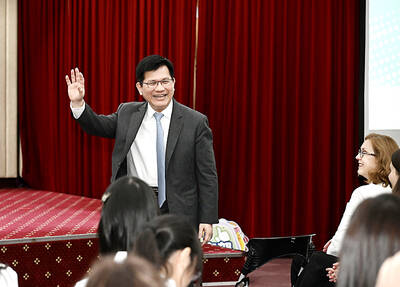Motorola Inc, the second-biggest mobile-phone maker, said it will begin marketing a full line of cellphone chips to rivals as the company tries to revive fallen semiconductor sales.
The company, which sells cellphone parts and some chips, plans to offer a complete set of components beginning in the first half of 2002. Clients, which may include smaller phone makers in places such as China and Japan initially, would develop their own screens, interfaces and cases, Motorola said. Orders and details such as prices weren't disclosed.
"We are perhaps one of the very few, maybe the only, company that could produce the entire solution from antenna to the microphone and everything in between," said Peter Shinyeda, a corporate vice president in Motorola's semiconductor division.
Companies would be able to make phones "faster, cheaper and perhaps more efficiently than they can today," he said.
Chief Executive Christopher Galvin is trying to restore profit at Motorola as demand slumps for wireless equipment and chips. The company, whose semiconductor rivals include Texas Instruments Inc and Conexant Systems Inc, expects chip sales to fall this quarter and to rise 5 percent in the fourth quarter from the third.
Selling to rivals may cause tension between Motorola's mobile-phone and semiconductor divisions if demand rises, an analyst said.
"If it's done properly, it can probably help both operations be more successful," said Stan Bruederle, chief analyst for wireless semiconductor applications at market researcher Gartner Dataquest.
Motorola expects the strategy to generate a ``few billion'' dollars in extra sales within two to four years, Shinyeda said.
The company had a first-half pretax loss of US$805 million in the semiconductor business as sales dropped 30 percent to US$2.73 billion.
Motorola's second-quarter loss was US$759 million, or US$0.35 a share, compared with net income of US$204 million, or US$0.09, in the year earlier period, it said July 11. The company has cut debt and plans to eliminate 30,000 jobs this year.
The Schaumburg, Illinois-based Motorola saw its shares decline US$0.45 to US$18.05 on Monday. They had fallen 51 percent in a year, while the Standard & Poor's SuperCap Communications Equipment Index, which includes Motorola, had fallen 78 percent. The stock had rebounded, rising 76 percent since April.
The company forged the last link in the new strategy when it licensed microprocessor patents in December from ARM Holdings Plc, Europe's biggest chip designer, Shinyeda said. Motorola sells other components to mobile-phone makers such as larger rival Nokia Oyj.
Motorola has beaten rivals such as Nokia to market with the first phones for General Packet Radio Service, which offers faster Internet access on upgraded networks that run on the widely used Global System for Mobile Communications standard.
Parts for making a working combination GSM/GPRS phone are the first that Motorola plans to sell under the new strategy.
The company will attempt to sell full chipsets to Nokia, which has more than double the market share, Shinyeda said.
To win Nokia as a customer, Motorola would need to show "incontrovertible evidence that it's a better product than what they're using today," said another Gartner Dataquest analyst, Bryan Prohm, who follows the wireless-phone market.
The strategy may cause tension between Motorola's chip and phone businesses as the semiconductor unit supplies similar products both to customers and to the company's own production line, or if manufacturing capacity drops and the company must decide whom to supply, analyst Bruederle said.
Customers Motorola may try to sign for the chip set orders include smaller or less experienced phone makers such as Acer Communications & Multimedia Inc and GVC Corp of Taiwan and Samsung Electronics Co of South Korea.
The more successful Motorola's initiative, "the more they are setting up their own handset unit for stiff competition," said Joe Laszlo, an analyst at researcher Jupiter Media Metrix Inc. That may mean the company "has less and less reason to stay in the handset manufacturing business over time."

FIREPOWER: On top of the torpedoes, the military would procure Kestrel II anti-tank weapons systems to replace aging license-produced M72 LAW launchers Taiwan is to receive US-made Mark 48 torpedoes and training simulators over the next three years, following delays that hampered the navy’s operational readiness, the Ministry of National Defense’s latest budget proposal showed. The navy next year would acquire four training simulator systems for the torpedoes and take receipt of 14 torpedoes in 2027 and 10 torpedoes in 2028, the ministry said in its budget for the next fiscal year. The torpedoes would almost certainly be utilized in the navy’s two upgraded Chien Lung-class submarines and the indigenously developed Hai Kun, should the attack sub successfully reach operational status. US President Donald Trump

Taiwan Semiconductor Manufacturing Co (TSMC, 台積電) is expected to start construction of its 1.4-nanometer chip manufacturing facilities at the Central Taiwan Science Park (CTSP, 中部科學園區) as early as October, the Chinese-language Liberty Times (the Taipei Times’ sister newspaper) reported yesterday, citing the park administration. TSMC acquired land for the second phase of the park’s expansion in Taichung in June. Large cement, construction and facility engineering companies in central Taiwan have reportedly been receiving bids for TSMC-related projects, the report said. Supply-chain firms estimated that the business opportunities for engineering, equipment and materials supply, and back-end packaging and testing could reach as high as

ALL QUIET: The Philippine foreign secretary told senators she would not respond to questions about whether Lin Chia-lung was in the country The Ministry of Foreign Affairs on Wednesday confirmed that a business delegation is visiting the Philippines, but declined to say whether Minister of Foreign Affairs Lin Chia-lung (林佳龍) is part of the group, as Philippine lawmakers raised questions over Lin’s reported visit. The group is being led by Deputy Minister of Agriculture Huang Chao-chin (黃昭欽), Chinese International Economic Cooperation Association (CIECA) chairman Joseph Lyu (呂桔誠) and US-Taiwan Business Council (USTBC) vice president Lotta Danielsson, the ministry said in a statement. However, sources speaking on condition of anonymity said that Lin is leading the delegation of 70 people. Filinvest New Clark City Innovation Park

DEFENSIVE EDGE: The liaison officer would work with Taiwan on drones and military applications for other civilian-developed technologies, a source said A Pentagon unit tasked with facilitating the US military’s adoption of new technology is soon to deploy officials to dozens of friendly nations, including Taiwan, the Financial Times reported yesterday. The US Department of Defense’s Defense Innovation Unit (DIU) is to send a representative to collaborate with Taiwan on drones and military applications from the semiconductor industry by the end of the year, the British daily reported, citing three sources familiar with the matter. “Drones will certainly be a focus, but they will also be looking at connecting to the broader civilian and dual-use ecosystem, including the tech sector,” one source was